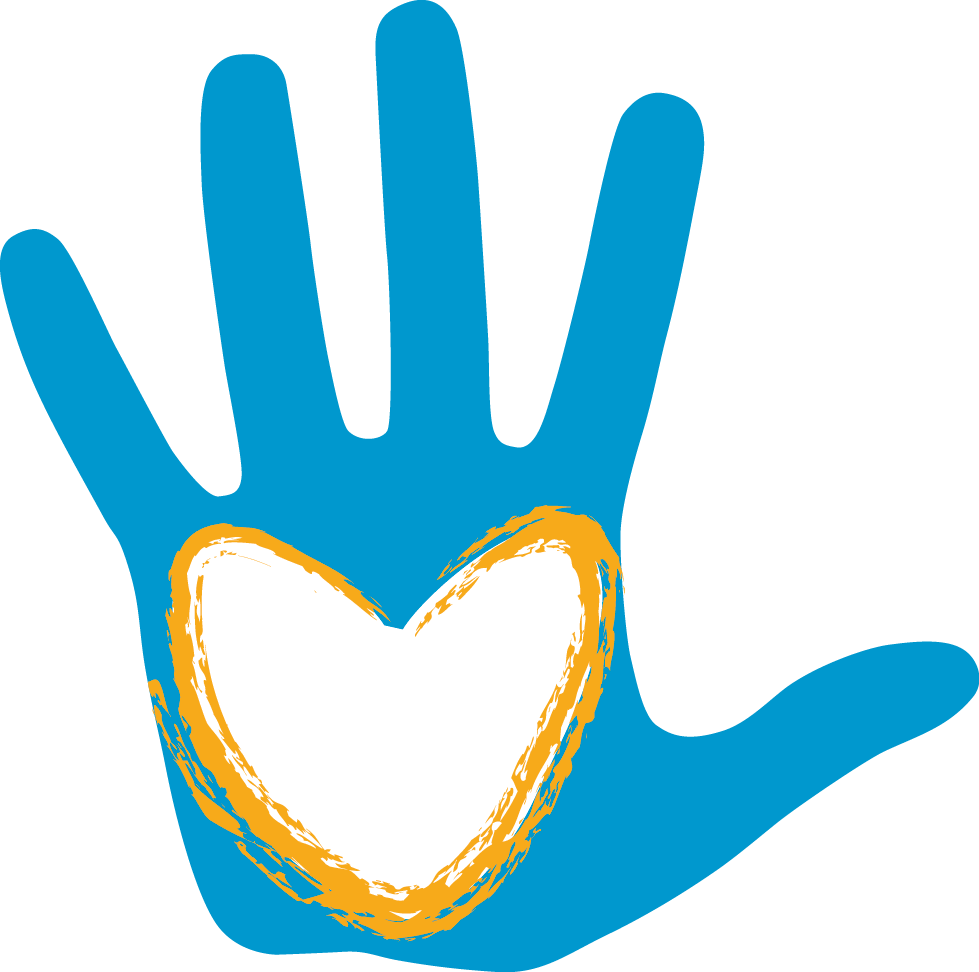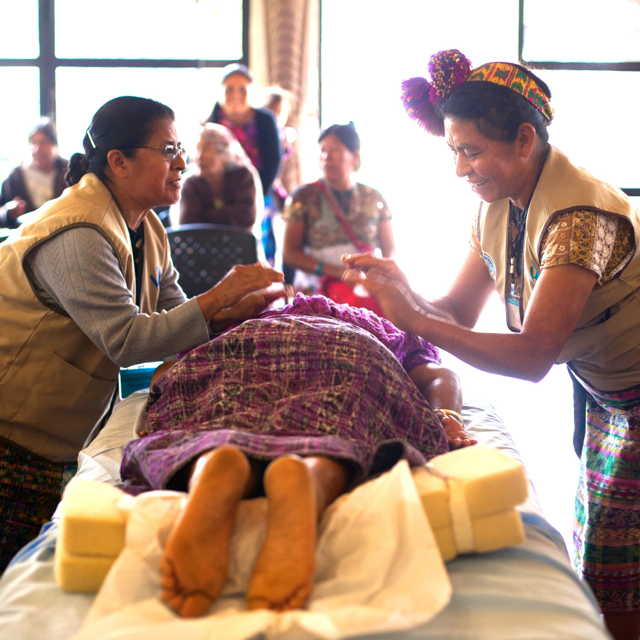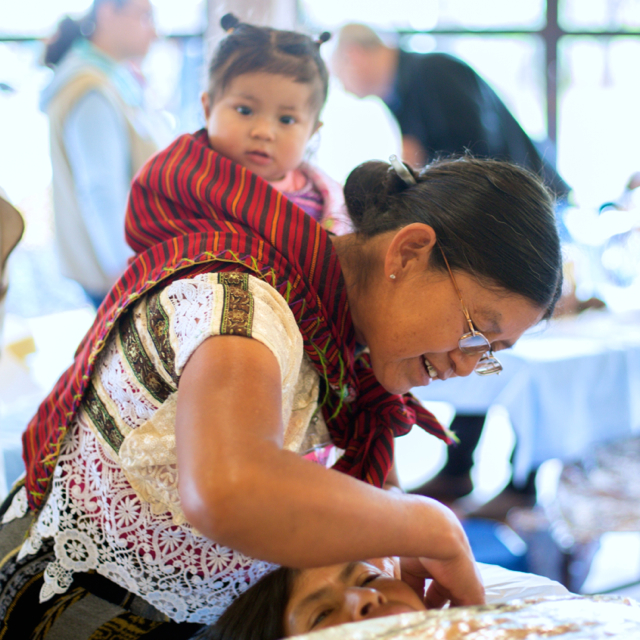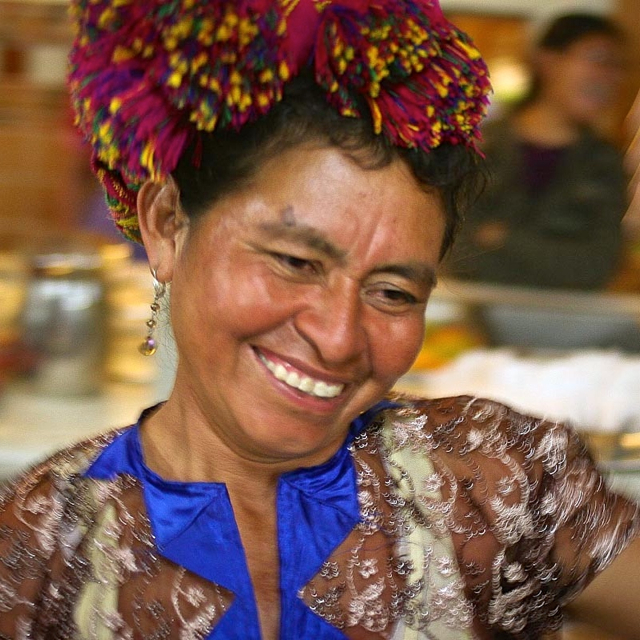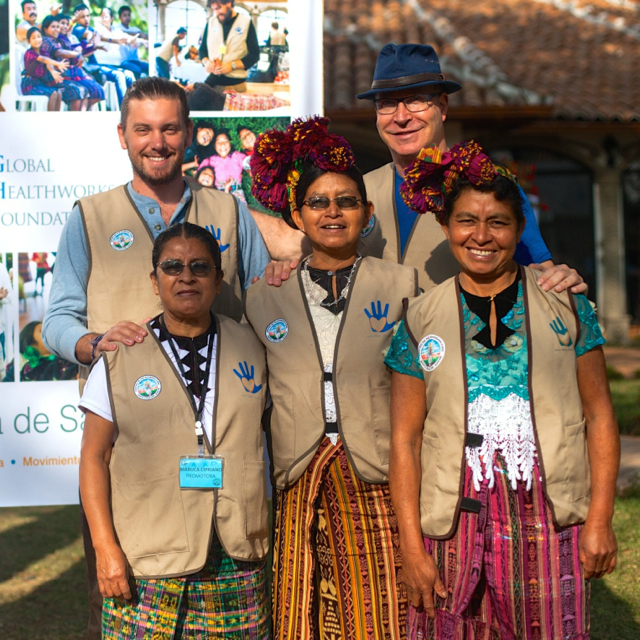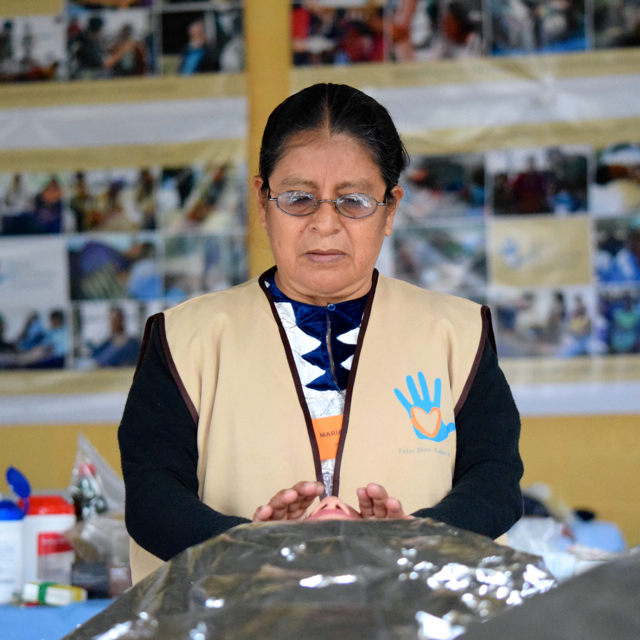The healthworks of Maruca, Rosa, and Magdalena epitomizes GHF’s efforts to train local health promoters to be fully integrated team members both within our GHF community and in their own communities. The three long-time friends from Sacapulas perform essential clinic functions: Reiki energy healing, auricular acupuncture, massage, and moxibustion heat therapy; and they are a great example for our other promoters. We are extremely grateful that these community leaders continue to be part of our GHF team. Read all about their story with Global Healthworks Foundation below.
Las Tres Pajaritas: Magdalena, Maruca, and Rosa Play an Integral Part in GHF Health Promotion
Rosa Arcón massages the back of the middle-aged woman lying on the jornada (medical mission) treatment table before her. She pats either side of her spine gently and rhythmically, as if drumming along to her favorite song. Maruca Cipriano approaches, watching Rosa’s technique closely. After suggesting a more effective method, Maruca joins Rosa in patting the patient’s back. Fellow health promoter, Magdalena Pajarito, watches quietly behind them, observing their cadenced method of treatment and asking questions about how best to improve her own massage practice.
Long-time friends from Sacapulas, Rosa, Maruca, and Magdalena have been working with Global Healthworks Foundation (GHF) since 2012 and helped initiate the organization’s first mobile clinic in 2013. As GHF’s work has expanded, so, too, have the women’s skills and ability to treat jornada and clinic patients. “They represent one of the things we’re trying to accomplish here,” says Peter Caron, acupuncturist and local GHF Program Manager. “They are truly indigenous health promoters. They are also the bridge between our work and the K’iche’ language speakers who speak no Spanish. And they really know how to reach patients in their communities.”
“The work of Maruca, Rosa, and Magdalena epitomizes our efforts, and they are a great example for other promoters. I am extremely grateful that these community leaders continue to be part of our team.”
According to Dan Wunderlich, GHF Founder and Executive Director, the health promoters’ connection to the patients in their communities is particularly important—and, in fact, is one of the primary goals of GHF’s work in Guatemala. “In order for our work to be sustainable,” Dan explains, “it is essential that we train local health promoters to be fully integrated team members both within our GHF community and in their own communities. The work of Maruca, Rosa, and Magdalena epitomizes our efforts, and they are a great example for other promoters. I am extremely grateful that these community leaders continue to be part of our team.”
Luciano Laynez, Administrator for the Centro de Paz, adds the women know how to organize their time very well, because besides being health promoters, they are also leaders in their communities. “Cada una tiene familia a quienes tienen que cuidar y atender, pero saben cómo hacer un balance en sus actividades para poder ayudar a los pacientes, a las comunidades y a sus propias familias. (Each has a family they need to attend to, but they know to balance their activities to help their patients, their communities and their families.)”
Nearly inseparable, the three women complement each other in a variety of ways, both in personality and level of skill. Though the quietest of the three, Magdalena, Peter says, is “incredibly focused. She holds the energy of the group in a more understated way.” Magdalena’s more modest presence is balanced by Rosa’s gregarious nature. Always laughing, Rosa greets each patient and team member with a hug and a smile and will offer to perform a song for the group at any moment of the day. “Siempre canta (She is always singing),” says Eva Carrillo, GHF’s Mobile Clinic Coordinator. “En todo momento ‘las tres pajaritas’ cantan. Siempre están alegres, y nos hace sonreír. (‘The three little birds’ sing at any moment. They are always happy, and they make us smile.)”
Outside of their ability to make others smile, the three women also know how to perform essential clinic functions. Reiki energy healing, auricular acupuncture (or NADA), massage, moxibustion therapy, and yoga are among the skills they have learned since beginning with GHF in 2012. “He aprendido muchas cosas (I have learned many things),” Rosa explains of her time with the Foundation. “A mí me encanta el Reiki, y me gusta platicar con la gente, los pacientes. Somos muy felices. (I really love Reiki, and I like to talk with the people, the patients. We are very happy.)” Their ability to connect to patients, Peter says, is what sets the women apart from other volunteers and staff. “When we’re practicing in their community, patients go up to them first, and me, second,” he explains. “That’s the way it should be. For that reason, and others, I’ve seen an increase in the pride they feel to be part of our medical team. It’s a feeling of equality.”
Maruca—whom Eva calls “la supervisora (the supervisor)” of the three—echoes Peter’s sentiment about that connection. “Desde el principio hemos estado acá, ayudando a los pacientes (Since the beginning we have been here, helping the patients),” Maruca describes. “Me hace feliz cuando los pacientes me dicen que los tratamientos los ayudan. Hemos tenido buenos resultados. (It makes me happy when the patients tell me that the treatments help them. We have had good results.)”
And, according to Eva, without ‘las tres pajaritas,’ such results wouldn’t be possible. “Ellas son mujeres que siempre están pensando en los demás (They are women who are always thinking about others),” she says. “Es a causa de sus esfuerzos que los servicios de salud de la clínica móvil pueden ser sostenibles. Nunca dicen, ‘No quiero trabajar. Trabajan en todo momento y siempre están sonriendo. (It is because of their efforts in the mobile clinic that the health services we have learned how to provide can be sustainable. They never say, ‘I don’t want to work.’ They work all the time, and they are always smiling.)”
